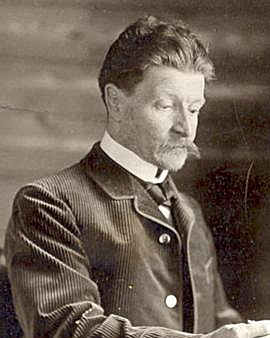Mikhail Aleksandrovich Vrubel, born in Omsk in 1856, was an artist who sought escape in his works. While his father was looking for a way out of financial problems, Vrubel spent a lot of time looking at pictures in children's books. His artistic interest was aroused by the exhibition Michelangelo's "The Last Judgment". The work had impressed him so much that he later designed an exact copy of the painting from memory.
School education was easy for him as long as he was interested in the subject. In addition to art, he was impressed by the natural sciences and toyed with the idea of devoting himself to a career in acting. His father, however, sent him to a law school, where his artistic activities were more and more pushed into the background. In Petersburg Vrubel decided to attend the Academy of Arts and there he met the Russian painter Pavel Chistyakov. He became his mentor and good friend.
Although Vrubel was oriented to the traditional motifs of the time, the works of the creative student had an idiosyncratic nature. This caused skepticism at first. However, acquaintances helped him to get various commissions. In 1884 he was given the task of participating in the restoration of the frescoes in the Vladimir Cathedral. After this year-long project, he traveled to Italy to fill his creative knowledge. Venice inspired the artist so much that he locked himself up for several weeks and painted one painting after another. Coming out of the flow of inspiration, the artist longed for human closeness. Back in Kiev, he proposed to an acquaintance, who mockingly rejected him. Vrubel fell into deep depression and hardly drew. He moved to Moscow, where, however, he did not fare any better. The feeling of hopelessness was reflected in the cycle of the work "Demon". In this project participated named artists such as Repin or Pasternak. The illustrations to Mikhail Lermontov's poem "The Demon" illustrate his pessimism. Furthermore, tragic actions and dark colors were evident in his works.
Even after a marriage and the birth of his son, his depressive episodes did not get better. His family abandoned him and forced hospitalization was inevitable. Despite mental confusion and strong hallucinations, Vrubel continued to paint.
×





 - (MeisterDrucke-20670).jpg)
 - (MeisterDrucke-20670).jpg)
_-_(MeisterDrucke-875886).jpg)
_-_(MeisterDrucke-875886).jpg)
.jpg)
.jpg)
.jpg)
.jpg)
.jpg)
.jpg)
.jpg)
.jpg)
.jpg)
.jpg)
.jpg)
.jpg)
.jpg)
.jpg)
.jpg)
.jpg)
_1904_-_(MeisterDrucke-381996).jpg)
_1904_-_(MeisterDrucke-381996).jpg)
.jpg)
.jpg)
.jpg)
.jpg)
 1890s - (MeisterDrucke-63588).jpg)
 1890s - (MeisterDrucke-63588).jpg)
.jpg)
.jpg)
_-_(MeisterDrucke-136131).jpg)
_-_(MeisterDrucke-136131).jpg)
.jpg)
.jpg)
.jpg)
.jpg)
.jpg)
.jpg)
 1905 (charcoal and gouache on paper) - (MeisterDrucke-43380).jpg)
 1905 (charcoal and gouache on paper) - (MeisterDrucke-43380).jpg)
.jpg)
.jpg)
.jpg)
.jpg)
.jpg)
.jpg)
.jpg)
.jpg)
.jpg)
.jpg)
.jpg)
.jpg)
.jpg)
.jpg)
.jpg)
.jpg)
.jpg)
.jpg)
_-_Dessin_de_Mikhail_Alexandrovich_V_-_(MeisterDrucke-1320522).jpg)
_-_Dessin_de_Mikhail_Alexandrovich_V_-_(MeisterDrucke-1320522).jpg)
.jpg)
.jpg)
.jpg)
.jpg)
.jpg)
.jpg)
.jpg)
.jpg)
.jpg)
.jpg)
 - (MeisterDrucke-122644).jpg)
 - (MeisterDrucke-122644).jpg)
.jpg)
.jpg)
.jpg)
.jpg)
.jpg)
.jpg)
.jpg)
.jpg)
.jpg)
.jpg)
.jpg)
.jpg)
.jpg)
.jpg)
_-_(MeisterDrucke-124019).jpg)
_-_(MeisterDrucke-124019).jpg)
.jpg)
.jpg)
_Otero_dite_La_Belle_Otero_-_(MeisterDrucke-1325374).jpg)
_Otero_dite_La_Belle_Otero_-_(MeisterDrucke-1325374).jpg)
.jpg)
.jpg)
.jpg)
.jpg)
_(Costum_-_(MeisterDrucke-1321006).jpg)
_(Costum_-_(MeisterDrucke-1321006).jpg)
.jpg)
.jpg)
.jpg)
.jpg)
.jpg)
.jpg)
.jpg)
.jpg)
.jpg)
.jpg)
.jpg)
.jpg)
.jpg)
.jpg)
.jpg)
.jpg)
.jpg)
.jpg)
.jpg)
.jpg)
.jpg)
.jpg)
.jpg)
.jpg)
.jpg)
.jpg)
.jpg)
.jpg)
.jpg)
.jpg)
.jpg)
.jpg)
.jpg)
.jpg)
.jpg)
.jpg)
.jpg)
.jpg)
.jpg)
.jpg)
_-_(MeisterDrucke-1428705).jpg)
_-_(MeisterDrucke-1428705).jpg)
.jpg)
.jpg)
.jpg)
.jpg)
.jpg)
.jpg)
.jpg)
.jpg)
.jpg)
.jpg)
.jpg)
.jpg)
.jpg)
.jpg)
.jpg)
.jpg)
.jpg)
.jpg)
.jpg)
.jpg)
.jpg)
.jpg)
.jpg)
.jpg)
.jpg)
.jpg)
.jpg)
.jpg)
.jpg)
.jpg)
_-_Oeuvre_de_Mikhail_-_(MeisterDrucke-1323499).jpg)
_-_Oeuvre_de_Mikhail_-_(MeisterDrucke-1323499).jpg)
.jpg)
.jpg)
.jpg)
.jpg)
_(Water_lillies)_-_Oeuvre_de_Mikhail_Alexandrovich_Vrubel_(V_-_(MeisterDrucke-1325061).jpg)
_(Water_lillies)_-_Oeuvre_de_Mikhail_Alexandrovich_Vrubel_(V_-_(MeisterDrucke-1325061).jpg)
.jpg)
.jpg)
_-_(MeisterDrucke-381994).jpg)
_-_(MeisterDrucke-381994).jpg)
.jpg)
.jpg)
_-_(MeisterDrucke-381989).jpg)
_-_(MeisterDrucke-381989).jpg)
.jpg)
.jpg)
.jpg)
.jpg)
.jpg)
.jpg)
.jpg)
.jpg)
_-_Oeuvre_de_Mikhail_Alexandrovich_V_-_(MeisterDrucke-1322823).jpg)
_-_Oeuvre_de_Mikhail_Alexandrovich_V_-_(MeisterDrucke-1322823).jpg)
.jpg)
.jpg)
_Dessin_de_-_(MeisterDrucke-1314104).jpg)
_Dessin_de_-_(MeisterDrucke-1314104).jpg)






